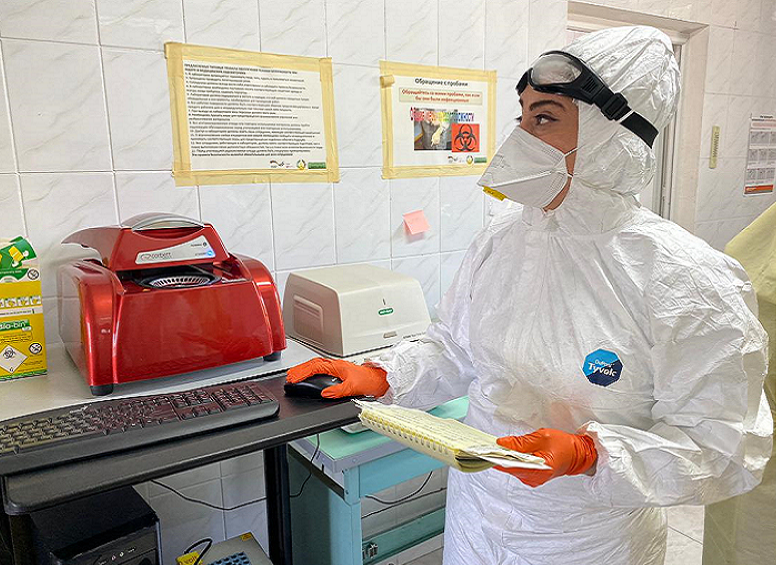Building Laboratory Muscle in Tajikistan
Subtitle
Lab workers learn how to perform high-quality COVID-19 tests
Date

A specialist at the Khujand SES Laboratory works with LHSS-procured PCR equipment in September 2020. (Photo: LHSS Project-Tajikistan)
Heading
Farida Sharipova, a medical laboratory specialist in Khujand, Tajikistan, knew that COVID-19 cases were climbing in April 2020. She also knew that testing is the first step in identifying and treating patients. What she didn’t know was how to use state-of-the-art COVID-19 testing techniques.
Farida is one of 24 government laboratory specialists who, thanks to support from the LHSS Project, recently learned how to use polymerase chain reaction (PCR) technology to diagnose COVID-19. PCR testing detects the virus’s genetic material. It is one of the most accurate methods for detecting, tracking, and studying the virus, and using it is a key to breaking the chain of transmission.
Early in the pandemic, there were no laboratories equipped for PCR testing in Khujand, Tajikistan’s second largest city. To address this challenge, LHSS teamed with USAID’s mission in Tajikistan and the country’s Ministry of Health to train laboratory specialists throughout the nation. Following World Health Organization (WHO) protocols, the training covered all aspects of PCR testing, from collecting samples and reading and interpreting test results, to managing the supply of test kits.
“I am proud that I was nominated to participate at these trainings,” said Farida. “Now I will be able to do testing for COVID-19 in my home city.”
‘Thanks to high-quality test results, doctors have saved the lives of many patients,’ says laboratory head Domullojonova Muminakhon.
With support from WHO, LHSS also helped the Khujand State Sanitary and Epidemiological Service (SES) Laboratory procure PCR testing equipment and, in September 2020, LHSS provided on-the-job training and mentoring to Farida and her colleagues so they could use their new equipment safely and effectively.
“Timely mentoring and on-the-job training helped eliminate problems specialists encountered in interpreting test results and ensuring quality control,” said Domullojonova Muminakhon, head of the Khujand SES Laboratory.
The laboratory now has the capacity to perform up to 600 PCR tests a day. As of September 30, it had conducted and analyzed 35,415 tests.
“Our lab’s role during the pandemic has been invaluable, and thanks to high-quality test results, doctors have saved the lives of many patients,” said Muminakhon.
By procuring PCR testing equipment and imparting advanced skills that will last a lifetime, LHSS is improving Tajikistan’s capacity to respond to the immediate COVID-19 threat – and ensuring that professionals will be ready to help their country face whatever infectious disease challenges may lie ahead.
